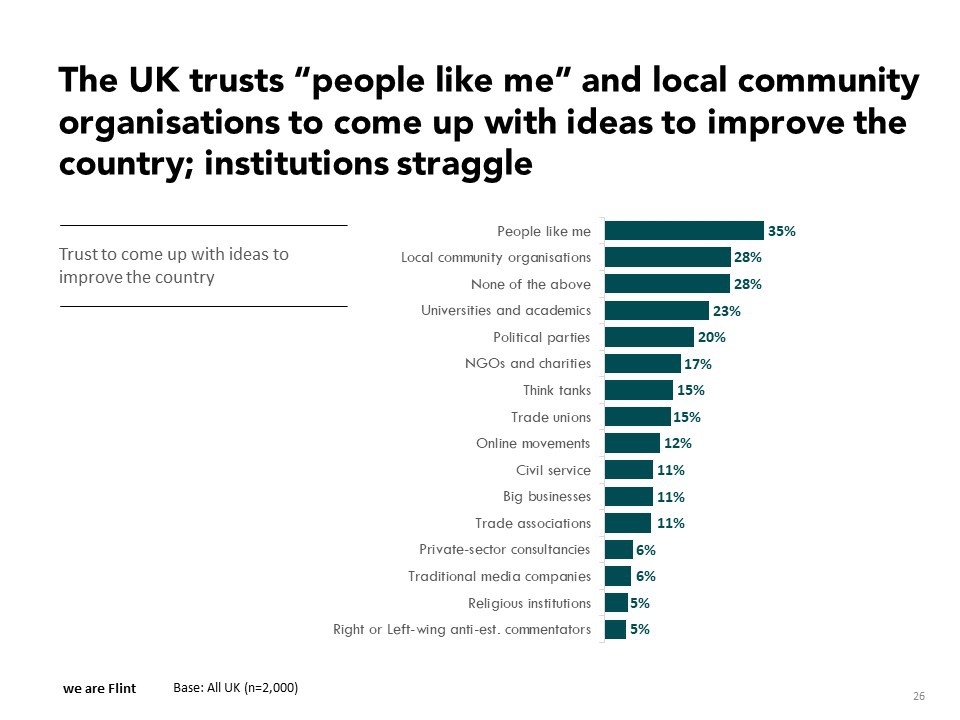
The power of storytelling in climate leadership

@castfromclay's research found that people want to be engaged by policy experts. So, how does @tomhashemi suggest relationships be built?
Share articleTime & again, heart rules over head in politics. Emotion beats rationale. @tomhashemi discusses the importance of PEOPLE in policymaking.
Share articleMost trust 'people like themselves' & local community orgs to come up with ideas to improve the country, as opposed to remote institutions.
Share articleWe put our vision for government into practice through learning partner projects that align with our values and help reimagine government so that it works for everyone.
A paradox defining our times is that it's never been easier for policy experts to communicate with the public, but they aren't doing it. Or at least not routinely, not meaningfully, and not in a way that invites true dialogue.
At Cast From Clay, we're obsessed by this question of public engagement. For us, it's essential for a healthy democracy, and in ensuring that policy experts maintain their license to operate.
We recently released new research revealing insights into what the public want from policy experts. We call it our ‘human policy' research, because this is what it grapples with. Should we make our policy more human? And, if so, how can we go about it?
Perhaps surprisingly - considering that they're supposed to have “had enough of experts” - we found that the public want to be engaged by policy experts. Half of the UK public would like experts to help them understand current affairs issues. That figure increases among people who say they are interested in politics. We found the same thing in the US.

Many people said they are concerned with the rise of political extremes, and want experts to counter fake news. If more moderate actors don't engage the public, they leave a void that those on the political extremes will happily fill. It's clear they already are. And part of the reason they're succeeding is because they are keen to experiment with engaging forms of communication.
Meanwhile, policymakers and experts want to create positive change in the world, but they often lack the skills and experience to build the support they need to get public opinion on their side. Without this they struggle to gain political support.
So, how can policymakers and experts better engage the public to maximise the impact of their work?
As much as we might claim the opposite, as human beings many of our views and actions are governed by our emotions rather than rational thinking. Some research suggests that as little as 28% of our behaviour is shaped by our conscious intentions.
Effective public engagement must take this into account. Take countering fake news, for example. A natural response might be to fact check an article and pronounce these facts to people. But we know that this doesn't really work.
One of the fundamental findings of cognitive science is that people think in terms of frames and metaphors… when the facts don't fit the frames, the frames are kept and the facts ignored. - George Lakoff
People need facts to be framed in a way that they can reconcile with their current world view. When you challenge people's emotions with facts alone, you aren't going to get anywhere.
If this is starting to sound a little left field, consider this: even when we asked ‘political insiders' whether they go with their head or their heart when it comes to politics, nearly half say their heart rules. Emotion beats rationale. That's people at the centre of policymaking.
This is a helpful reminder, if you needed it, that policy experts are also people.
So a good place to start is to ask yourself: What engages you, and what doesn't? When was the last time you had your mind changed, and why did that happen? When was the last time someone failed to convince you?
On that last question, it's likely that - as with most people - whatever you were being told didn't fit with your established world view.
That's because we're all human, and we need to be communicated with as such.
CPI rightly highlights public confidence as key to building and maintaining legitimacy. Trust is a valuable commodity and for most actors these days, across sectors, it is their license to operate. Once lost, it is not easily regained. Without it, organisations face irrelevance at best.
A key component of maintaining trust is that you do what you say you are going to do. In other words, those developing public policy need to be accountable.
As our research highlighted, the public values accountability, but does not think policy experts are held accountable. On the other hand, political insiders value accountability less and believes that policy experts are held to account.
There is a significant difference in opinion between those that work at the heart of government, and those that are impacted by government policy. We call this the ‘accountability gap'. It is the bedrock of the populist surge we see in many democratic countries today.
The risk of underestimating the importance of trust while overestimating your trust-worthiness is something to be very aware of when it comes to designing public engagement. It cannot be tokenistic, and it cannot promise things it won't deliver. When it's done right, it needs to be about dialogue and conversation rather than one way, top down approaches.
We all hate being talked at and told what to do, especially when we don't think people understand our perspective. This affects our view on political and social issues, as well as their solutions.
For example, when we asked people “Who do you trust to come up with ideas to improve the country?” over all, people mainly trust “people like me”. And while no institution triumphed, “community organisations” came out top. Contrast that to more remote institutions like “big business” and the civil service - which come much further down the list - and it seems that proximity to the individual has currency. It matters to have a meaningful presence in people's lives.

This is even more revealing when you look at how people prefer to engage with political ideas. In the top 5 were “conversations with friends” and “social media” (particularly among younger people, which gives us a sense of where things are headed over the next decade).
What these things have in common, again, are proximity. Also - and maybe most importantly - exchange. People are value ideas that come to them through conversation, rather than broadcast. That's important for policy experts, who tend to pop up, bestow information and then disappear again.
One way of evolving from broadcast, is for policy experts to shift to be more of a convenor of ideas. Not convening the elite - which many policy experts already do very well - but the public.
Because you cannot have public impact without the public.
In the spirit of convening, we want to hear from you. Have you tried to build relationships with the public on policy? What has worked? What hasn't? Get in touch.












